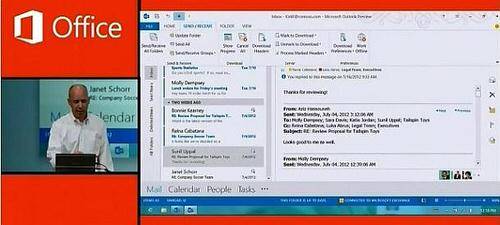
Office 365, already priced as a cheaper, subscription alternative to Microsoft’s retail Office packages, may offer families and friends additional discounts, provided that Microsoft doesn’t close a key loophole.
What Makes A Household?
At this point, Microsoft’s Office 365 package charges one fee per household, but it’s not exactly clear what the definition of “household” is. Since the Office 365 license covers five devices, it’s unclear whether Microsoft will treat a “household” as a single IP, or cover extended family such as parents and adult children who may move out of the home.
Microsoft representatives couldn’t supply an answer. “I don’t believe any one has asked me that question before,” said Oliver Roll, a general manager at Microsoft.
After teasing Office 365’s launch on its website, Microsoft has come clean: Tuesday marks the consumer launch of Office 365, plus Office 365 University. Consumers will pay $99.99 per year ($8.34 per month) for Word, Excel, PowerPoint, OneNote, Outlook, Publisher and Access, plus 60 minutes of Skype calling and extra SkyDrive storage; students will pay $79.99 for four years of the University bundle. Microsoft also revealed that business users will receive access to Office 365 on February 27.
Microsoft also launched its traditional Office packages: Home & Student ($139.99), Home & Business ($219.99), and Professional ($399.99). Each version can be licensed by either one Mac or PC, forever, except for the Professional version. That’s PC-only.
Microsoft’s Roll said that the typical household would benefit from the new Office 365 pricing, but the exact payoff will vary by the number of devices in the house and other factors. “I’m a busy parent… I might have five or six devices at home and at work,” he said. “I want Office to run on those devices, and I want instant access to my documents and settings on the device I’m using. People have begun to expect instant access to music and movies with services like Netflix; we don’t think Office is any different.”
The addition of Office 365 University adds a new wrinkle for students, however. Previously, students who purchased Office 2010 University received a perpetual license to the software for $99.99. The Office 365 version only lasts four years, but grants students a pair of licenses, they could use it on a Surface Pro as well as a notebook PC, for example, or even split the cost with a roommate.
Roll said he didn’t know whether or not a consumer Office 365 license would be geographically locked – in other words, why couldn’t a family simply install a copy of Office 365 on a PC that a student would take to college? (From a price perspective, however, it really doesn’t matter that much; $99.99 split among five PCs is $20; multiply that by four years, and it’s $80, the same as the University Bundle.)
A small family with one or two PCs, however, plus a set of parents, might benefit from essentially paying $20 per year, per PC.
Sharing Can Be A Good Thing
How strictly Microsoft enforces that policy is well, up to Microsoft. HBO, for example, notoriously doesn’t enforce username and password sharing, providing up to three accounts per subscriber. “In private, HBO executives did not dispute the notion that the password borrowing could lead young people to subscribe to HBO in the future,” The New York Times has reported. Sharing an Office 365 account might do the same.
Unlike Google, Microsoft’s Office 365 doesn’t live entirely in the cloud, as users will be able to download copies to their PC that will allow them to run offline. Patching and upgrades will happen automatically, however, and Roll said that new features will be added more frequently than Microsoft has traditionally done.
Businesses Love Office 365
Microsoft also claimed that Office 365 has been a hit among its enterprise customers; 20% of all enterprises that use Office have subscribed to Office 365, and among small and midsize companies, Microsoft has seen a 150% increase, Roll said.
Part of that may be ascribed to Google, which recently pared the free version of its Google Apps product from its enterprise portfolio. At the beginning of the year, both the Department of Defense and the city of Chicago signed on to use Office and other Microsoft products and services. Now, Roll said, the Catholic International Education Office, covering 2.5 million students across 103 countries, has signed on to use Office 365, as has the All India Council for Technical Education.
“In the business world some of those core parts… are the same – business users want to be able to access their documents regardless of what device they’re using,” Roll said. “They’d like their settings to be personalized; SkyDrive is an important part of the business services. I save documents at work to SkyDrive… and on my home PC, I pick up where I left off.”
Office 365 will also include the Office Store, a marketplace for add-ons and plug-ins that includes project software, new dictionaries, and even companies like Gliffy, which Microsoft invited even though it competes with Microsoft-branded products.
(See Inside The New Microsoft Office App Store: One Developer’s Real World Story.)

















